Putting obesity at the centre of the global health agenda at UNGA 80
The World Obesity team has returned from New York after an eventful United Nations General Assembly (UNGA 80), which included the Fourth UN High-Level Meeting on non-communicable diseases (NCDs).
Throughout the week, we made our presence felt - calling on governments to honour their commitments, strengthen action on obesity prevention and care, and recognise that without progress on obesity, there can be no real progress on NCDs. Crucially, the voices of people living with obesity were placed at the centre of these discussions.
This year’s Global Obesity Forum was a standout moment, attracting record interest with every seat filled and a waiting list of participants eager to join. Alongside this success, we celebrated World Obesity members receiving recognition at the United Nations Inter-Agency Task Force on NCDs awards, and we contributed to high-level roundtables and panels - ensuring obesity was firmly on the agenda wherever it mattered most.
For half of humanity
As highlighted by our campaign, by 2035, nearly half of humanity - 4 billion people - will live with overweight or obesity. Already 1 billion people live with obesity, a disease which also drives millions of deaths each year from diabetes, hypertension, and cancers. According to a recent UNICEF report, for the first time, more children globally are living with obesity than underweight.
Without urgent action, we're leaving half the world behind, with the economic costs of obesity reaching nearly 3% of global GDP by 2030. As Pau Gasol highlighted at our flagship event The Global Obesity Forum (see below), we actually have 8 billion reasons to act on obesity, which affects the whole world: “It's an us, all of us, problem, and we need to act now.”
OUR CAMPAIGN

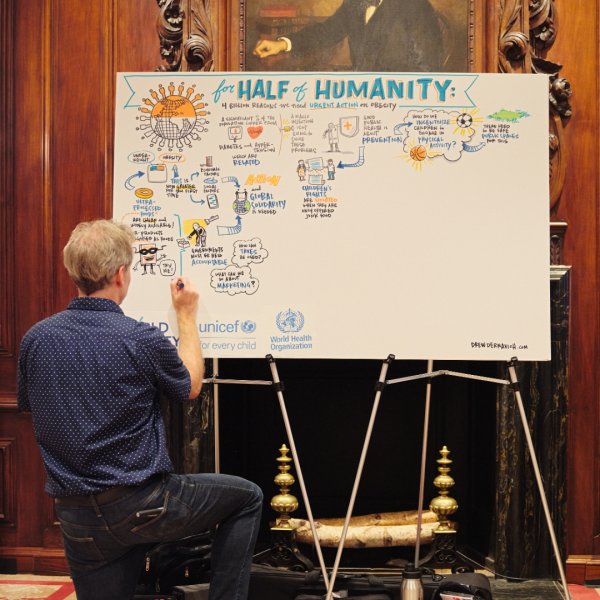
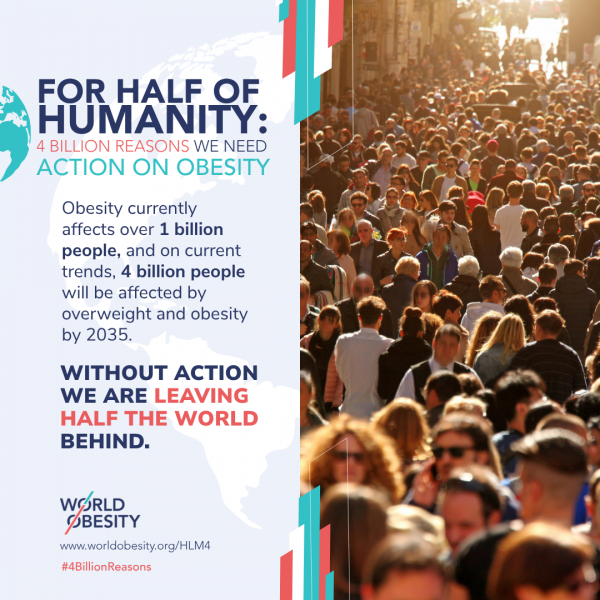
Raising our voices at the United Nations
World Obesity CEO Johanna Ralston and lived experience Board member, Karen Sealey attended the High-Level Meeting to make our concerns heard. The Political Declaration of the High-Level Meeting on NCDs falls short to deliver for us all. It will fail to deliver on the NCD targets it set out to achieve but, most importantly, it will fail the 1 billion currently affected by obesity, as well as younger generations, where we are seeing the most alarming trends, particularly in low- and middle-income countries.
The Declaration excludes our recommendations for the inclusion of obesity in primary care, references to obesity are limited to a handful of mentions in prevention, and the root causes and scale of the obesity epidemic are not reflected.
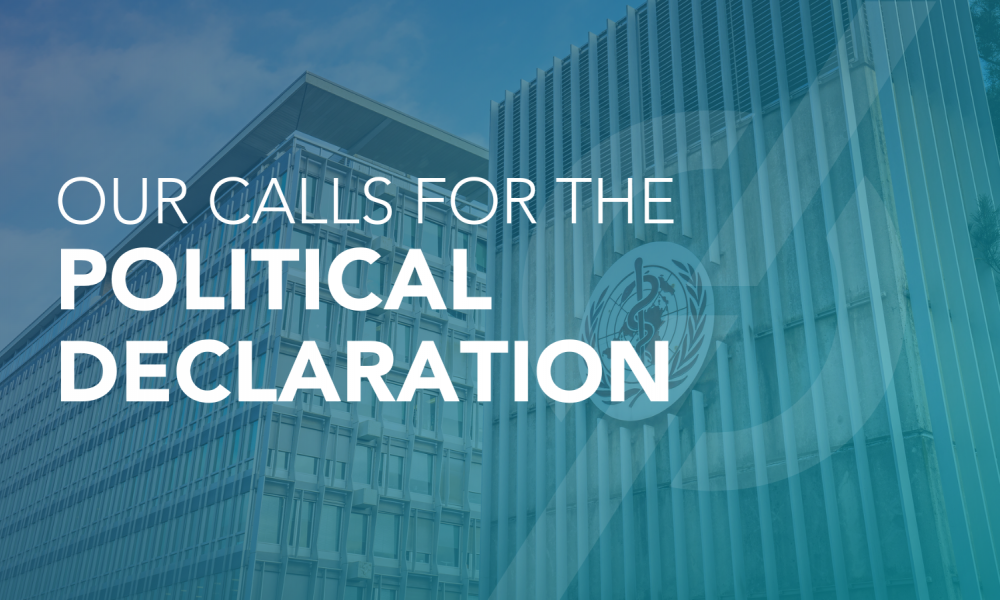
World Obesity’s urgent calls to action for the Political Declaration:
- Recognise obesity as a chronic disease
- Commit countries to implement WHO’s multisectoral recommendations and join the WHO Acceleration Plan to Stop Obesity
- Integrate obesity prevention and treatment into primary health care
- Ensure people with lived experience are at the centre of the response
- Commit countries to implement excise taxes on sugar-sweetened beverages, which can both prevent obesity and generate revenue that can be channelled into funding obesity care.
"The absence of obesity in primary care in the Political Declaration means that it only addresses half of the problem, which is unfortunate because we need an integrated prevention and management approach as outlined in the WHO acceleration Plan." Johanna Ralston CEO speaking at the UN High-Level Meeting on NCDs
The Political Declaration fails to win approval — and inaction is inexcusable.
The Political Declaration on NCDs has failed to win approval - and inaction is inexcusable. Failure to act is not neutral; it is a choice that will cost lives. Each year of delay locks in higher rates of diabetes, hypertension, cancer, and other NCDs driven by obesity. The economic toll is equally stark: without decisive action, obesity alone will cost nearly 3% of global GDP by 2030.
This failure will fall hardest on children and young people, particularly in low- and middle-income countries, condemning them to poorer health and shrinking opportunities. We support those Member States and partners who worked together to develop the Declaration, and those already taking decisive action through evidence-based policies. Their leadership shows that progress is possible - and must accelerate.
Governments cannot claim progress on NCDs or UHC while inertia on obesity persists. Delay is denial - and the cost of doing nothing will be measured in lives lost and futures diminished.
Lived experience at the heart of discussions
Despite the numbers, obesity has been sidelined in global health and politically neglected: misunderstood as personal failure rather than structural injustice. The World Obesity lived experience delegation sought to change this narrative, speaking at several events, including:
Ian Patton (Canada) at the 'Real voices, better choices: Implementing national NCD and mental health policies led by lived experience' roundtable; Amber Huett-Garcia (United States) speaking at 'Accelerating action toward SDG 3.4: Putting obesity on the NCD agenda' panel by Economist Impact; Sarah Le Brocq (United Kingdom) speaking at the Science Summit convened by the Global Health Connector on 'The Power of Convergence: Enabling Prevention and Management of Obesity and Related NCDs'; and Dr Kim Yoohyun (South Korea) speaking at the side event by the Health and Global Policy Institute (HGPI), titled 'Promoting Person-Centred NCDs and Mental Health Policies in the Global Community: Japan’s Leadership and Contribution in Asia and Globally'.

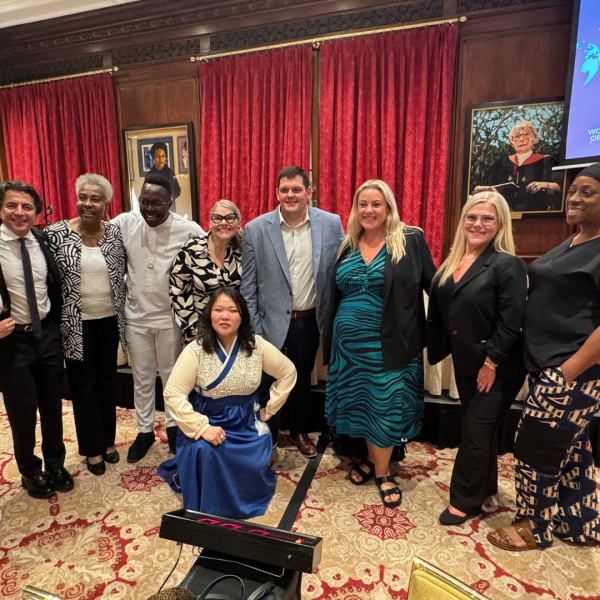


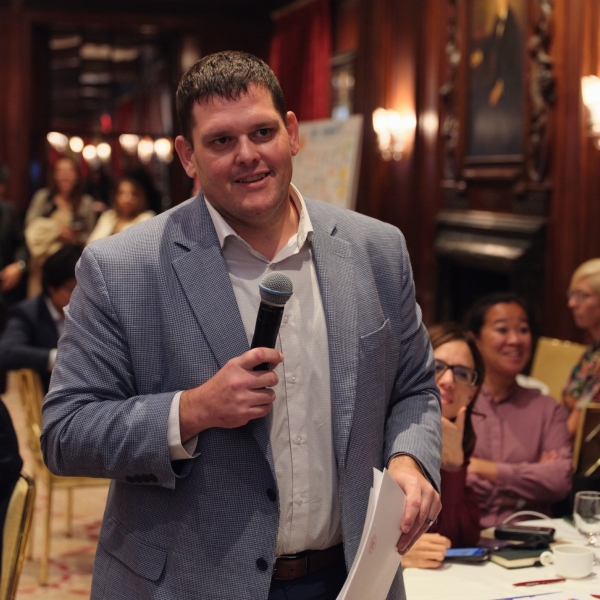
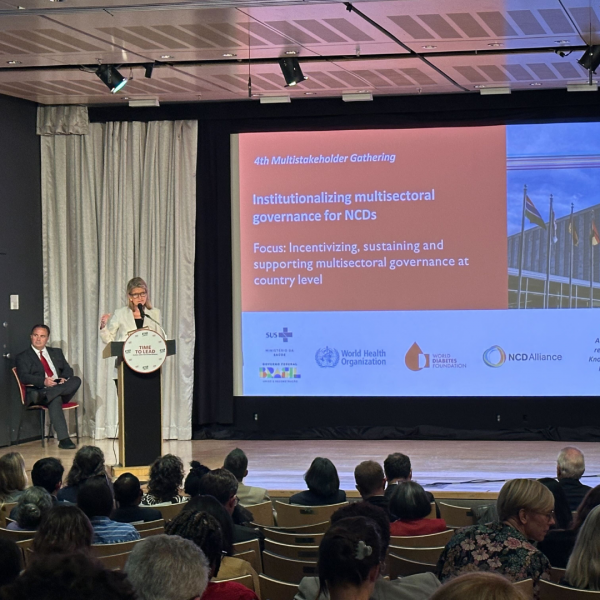
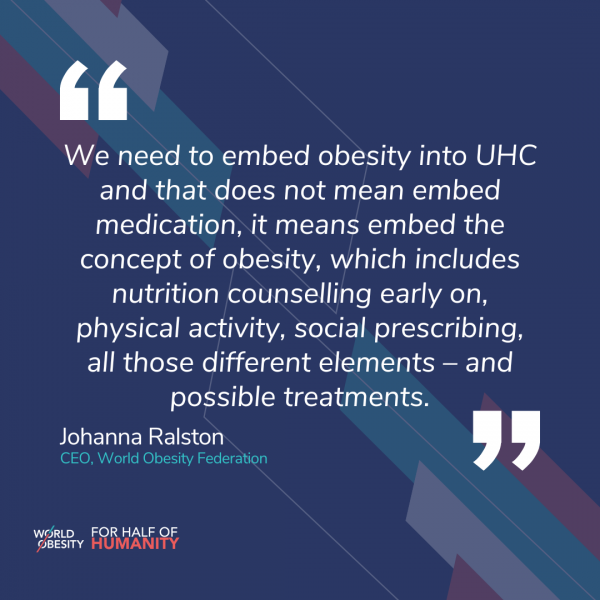


Obesity at the heart of the NCD response
Alongside calling out global leaders, our delegation was in New York to offer solutions and a way forward. We reminded audiences that investing in proven, effective obesity prevention and treatment solutions delivers a double dividend: generating health and economic gains while addressing a root cause of the NCD burden. What’s needed now is political will that matches the scale of the challenge - action that is people-centred, multisectoral, and grounded in rights and evidence.
At the Foreign Policy Health Forum panel on 'Policies for a Healthier Future: Rethinking National Strategies on Obesity', our CEO, Johanna Ralston, stressed the importance of embedding obesity into discussions at UNGA and beyond, including the 2027 High-Level Meeting on UHC.

World Obesity President, Simón Barquera, and Board Member and lived experience advocate, Amber Huett-Garcia, joined the Economist Impact side event 'Accelerating Action Toward SDG 3.4: Putting Obesity on the NCD Agenda.' Their interventions underscored obesity as both a challenge and opportunity in the global NCD response.
President Barquera also spoke at the Devex Impact event on Global Metabolic Health, highlighting the importance of preventive public health measures:
“One of the main tools we have to stop this epidemic are public health measures to prevent consumption of unhealthy food and drinks like the soda tax. I regret that sugar taxes were removed from the Political Declaration because we all know that the evidence is there, and we know that they were removed because of interference from industry. The World Obesity Federation is working hard to advocate for treatment access in primary healthcare but also on how to effectively prevent the drivers of obesity and other metabolic diseases.”
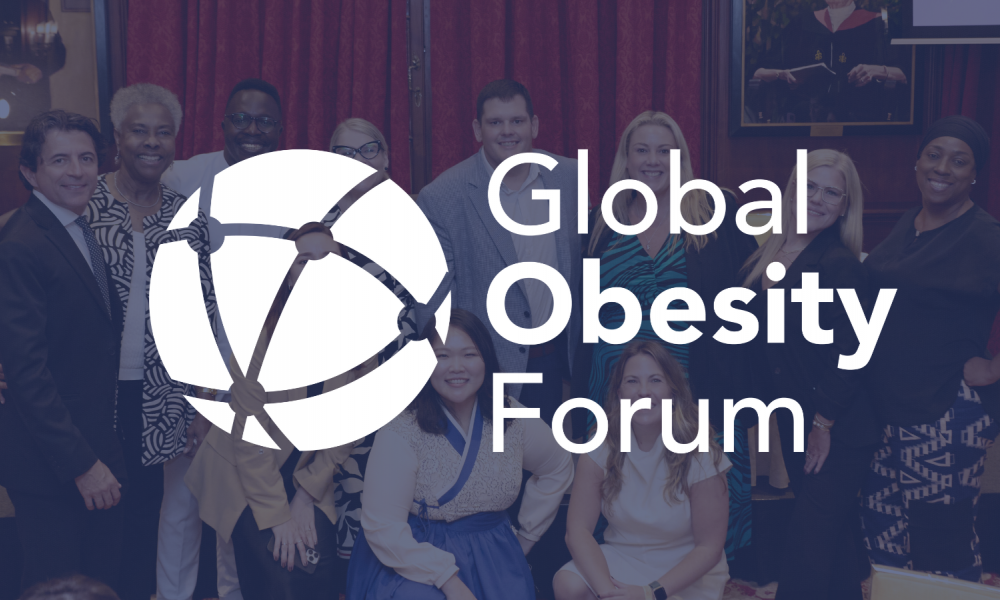
Charting a path forward at the Global Obesity Forum
An energy of optimism and collaboration fuelled a packed room for the 2025 Global Obesity Forum, where leaders, policymakers, and advocates came together to share ideas and align on a roadmap for action. Speakers included Pau Gasol, Jeremy Farrar, lived experience and youth advocates.
READ THE FULL REPORTDriving multisectoral action
World Obesity participated in the Fourth Multistakeholder Gathering on NCDs and mental health, organised by the NCD Alliance and co-sponsored by the Ministry of Health of Brazil, the World Diabetes Foundation, and the WHO Global Coordination Mechanism on NCDs. The event united ministers, civil society, academics, and private sector representatives to share practical solutions and emphasise multisectoral efforts, spotlighting the importance of sustained political leadership, lived-experience perspectives, strategic use of data, and inclusive narratives to turn global commitments into action.
The first panel, moderated by Johanna Ralston, CEO of the World Obesity Federation, looked at how to institutionalise multisectoral governance, and was informed by a new WHO publication that World Obesity co-authored: Advancing multisectoral and multistakeholder actions on noncommunicable diseases: thematic issue briefs | Knowledge Action Portal on NCDs.
The briefs highlight the fact that governments cannot address the global NCD crisis alone. Real progress depends on bringing in civil society, academia, the private sector, and - critically - people with lived experience to co-create, deliver, and monitor solutions.
Some key messages from our brief include:
- Effective NCD governance means embedding multisectoral collaboration into institutions, not treating it as optional or temporary.
- Civil society actors and academia provide advocacy, expertise, and accountability - helping policies move from paper to practice.
- People with lived experience must have meaningful roles in shaping decisions, ensuring that strategies respond to real needs and dismantle stigma.
- Success demands clear legislation, adequate financing, and political commitment at every level.

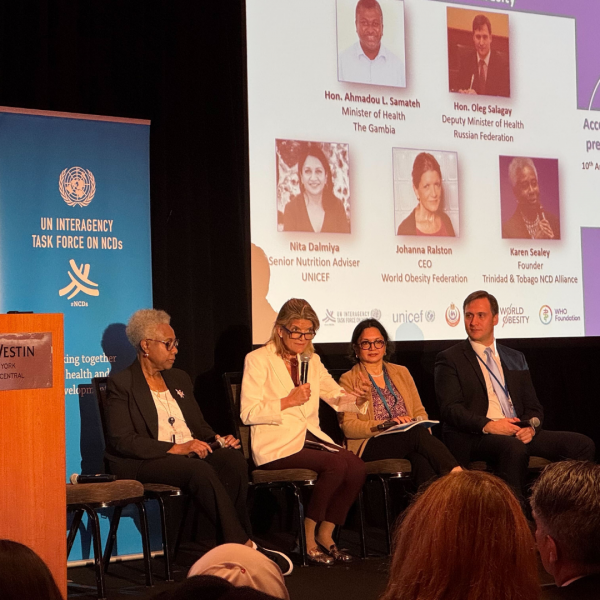
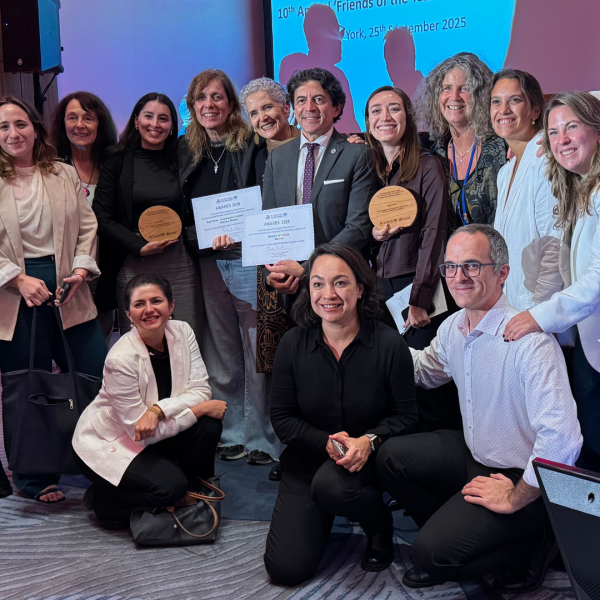
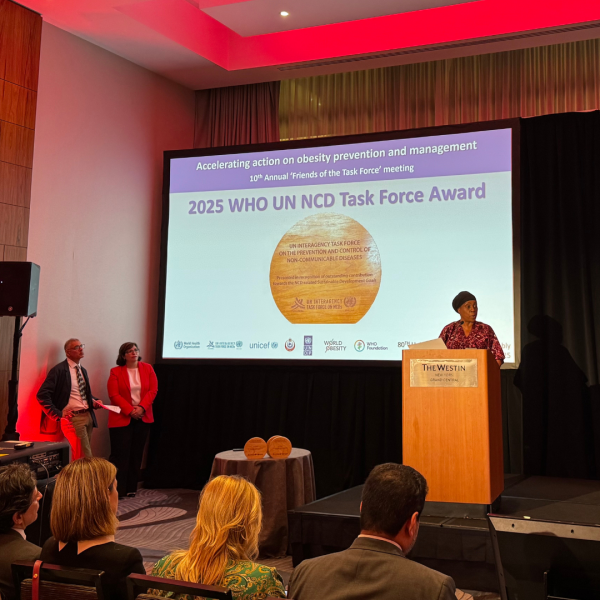
Recognition for World Obesity members
The week ended on a high when several World Obesity members and partners were celebrated at the United Nations Inter-Agency Task Force on the Prevention and Control of Non-communicable Diseases (NCDs) Award for 2025, which this year recognises work in the area of obesity prevention and management.
Cameroon Baptist Convention Health Services (CBCHS) was recognised for its pioneering community-based work to manage and prevent obesity. In response to the alarming rise in obesity and other NCDs in Cameroon, the CBCHS initiated the 'Non-Communicable Disease Control and Prevention Programme' focused on creating awareness, screening, treating, and referring NCD cases, reducing morbidity and mortality through sustainable, community-driven, and health system-integrated interventions targeting both prevention and clinical management.

Desmond Tutu Health Foundation for their leadership in obesity advocacy in South Africa. Building on two decades of HIV activism, the Desmond Tutu Health Foundation applies the same rights-based, community model to obesity. They published an agenda‑setting editorial, opened Mpilo Health Park, a youth hub fusing exercise, nutrition, mental health and SRH care, and led World Obesity Day campaigns that reached a million people and produced the WHO-referenced Johannesburg Declaration. Their trials delivered Africa’s first data on weight gain, and their experts advise WHO and World Obesity on global obesity guidelines and equitable GLP-1 access.
The Belgian Association for the Study of Obesity (BASO) was recognised for its leadership in putting obesity firmly on the national political agenda and amplifying the voices of people living with obesity. Through innovative initiatives such as Infobees - structured forums where patients directly inform the design of future care models - BASO has worked to ensure that obesity services are built around real needs and lived experience.

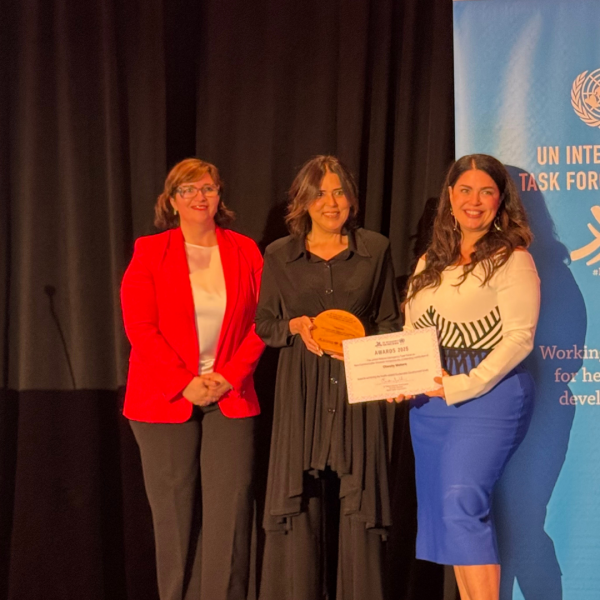
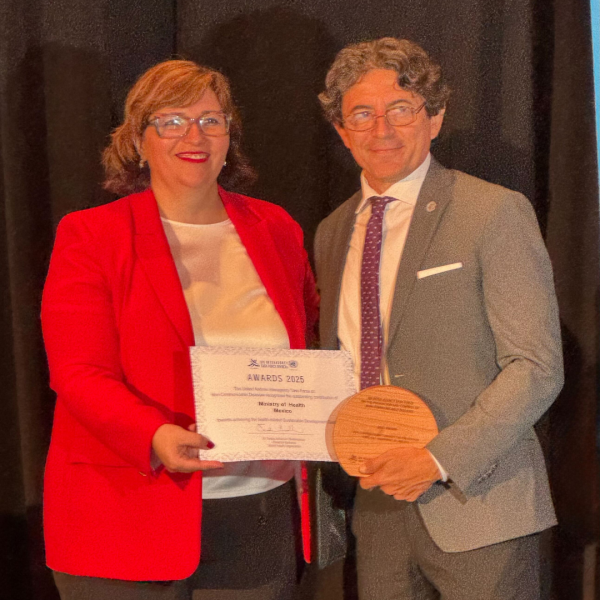
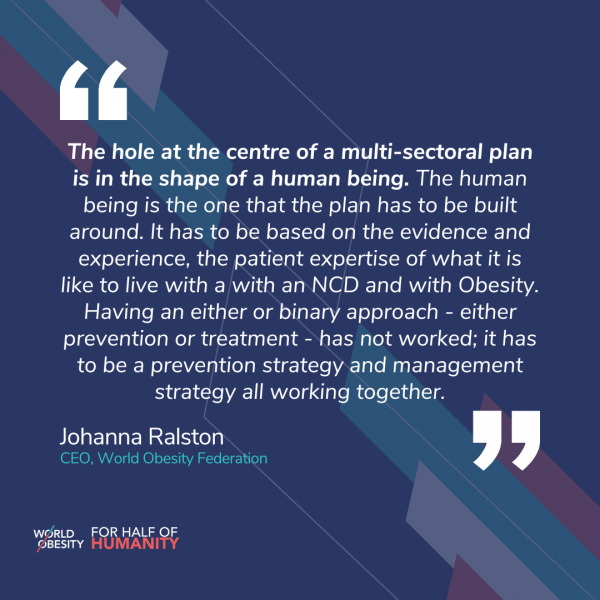
This rights-based, collaborative approach is helping to transform access to care in Belgium and shape policies that respond to obesity as a chronic disease. By working with the government, clinicians, and communities, BASO is advancing Belgium’s role as a forerunner in addressing obesity and ensuring that people living with obesity receive the care and dignity they deserve.
World Obesity government partners, the Republic of Seychelles, Mexico and South Africa were also recognised for their outstanding commitment and action to prevent and control obesity.
There were also inspiring words from the perspective of lived experience, with Obesity Matters (Canada) recognised for their groundbreaking OM Wellness Workshop - a free, 12-month virtual programme co-created with clinicians and people living with obesity. Rooted in lived experience, the workshop reduces stigma, builds resilience, and supports sustainable lifestyle changes. Together with their digital platforms, it has reached more than 10 million people worldwide, with independent surveys showing striking outcomes: a 36% drop in self-blame, a 29% reduction in guilt and shame, and a 35% increase in confidence.
For the Obesity Matters community, this recognition is more than an award - it is momentum. It affirms that compassion and community, grounded in lived experience, can complement clinical care and inspire global change in how obesity is seen, understood, and treated.
UNGA 80 marked both a moment of disappointment and of resolve.
If governments cannot agree, civil society, lived experience advocates, and forward-thinking countries will keep building solutions. As we look to 2027’s High-Level Meeting on Universal Health Coverage and beyond, the message is clear: health for all is impossible without action on obesity.
The time to act is now.
For half of humanity
Find out how you can join the call for urgent, united action on obesity. Explore resources, key messages, and advocacy tools in our For Half of Humanity campaign toolkit - and help ensure no one is left behind.
Our campaignRelated News
View all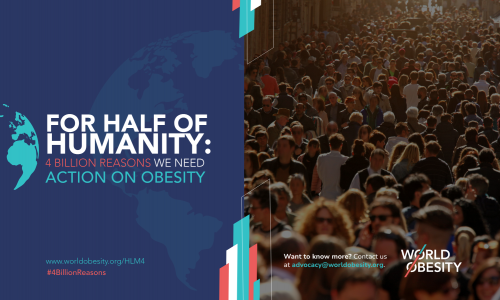
Aug 01, 25
For Half of Humanity: Four billion reasons we need action on obesity
Obesity affects over 1 billion people and will impact 4 billion people - half of humanity - by 2035 if we fail to act.
Read Post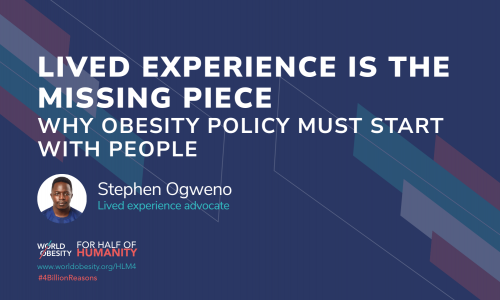
News Blog Aug 13, 25
“Lived experience is the missing piece” - Why obesity policy must start with people
For half of humanity: Stephen Ogweno explains why obesity policy must start with lived experience to drive real change.
Read Post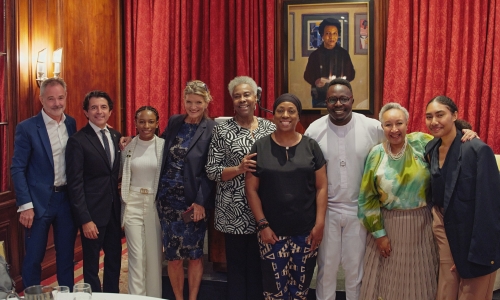
News Policy & Advocacy Oct 02, 25
From urgency to unity: leaders and advocates chart a path forward
The Global Obesity Forum 2025, hosted by the Global Obesity Coalition, took place in New York ahead of the HLM on NCDs.
Read Post